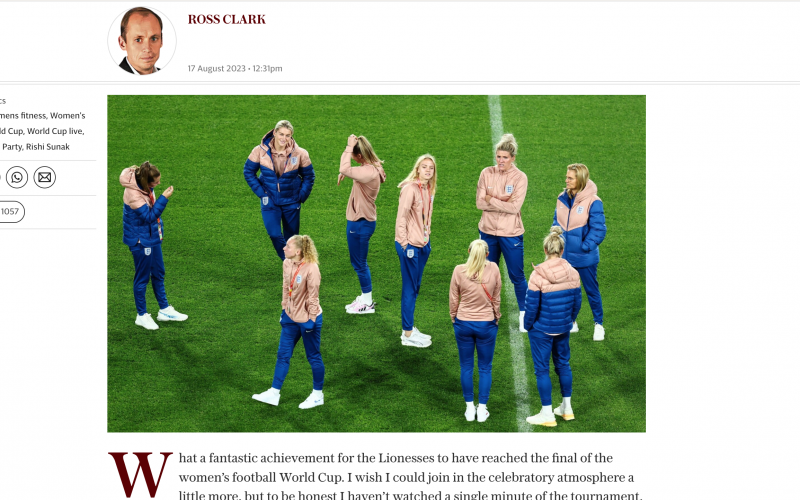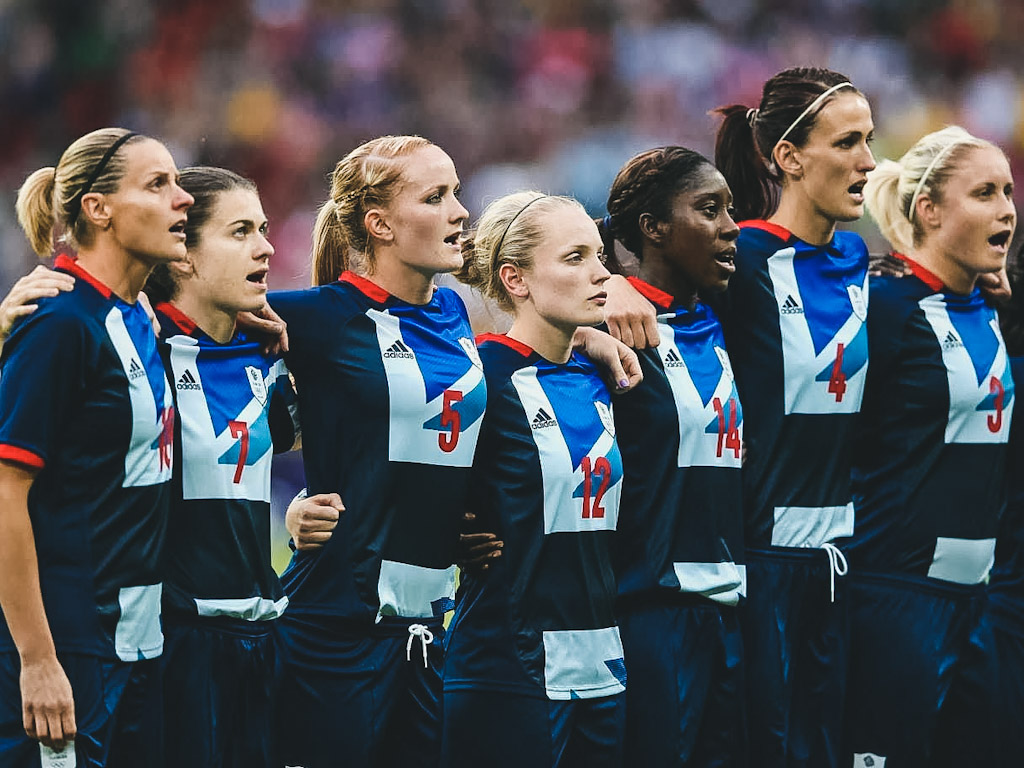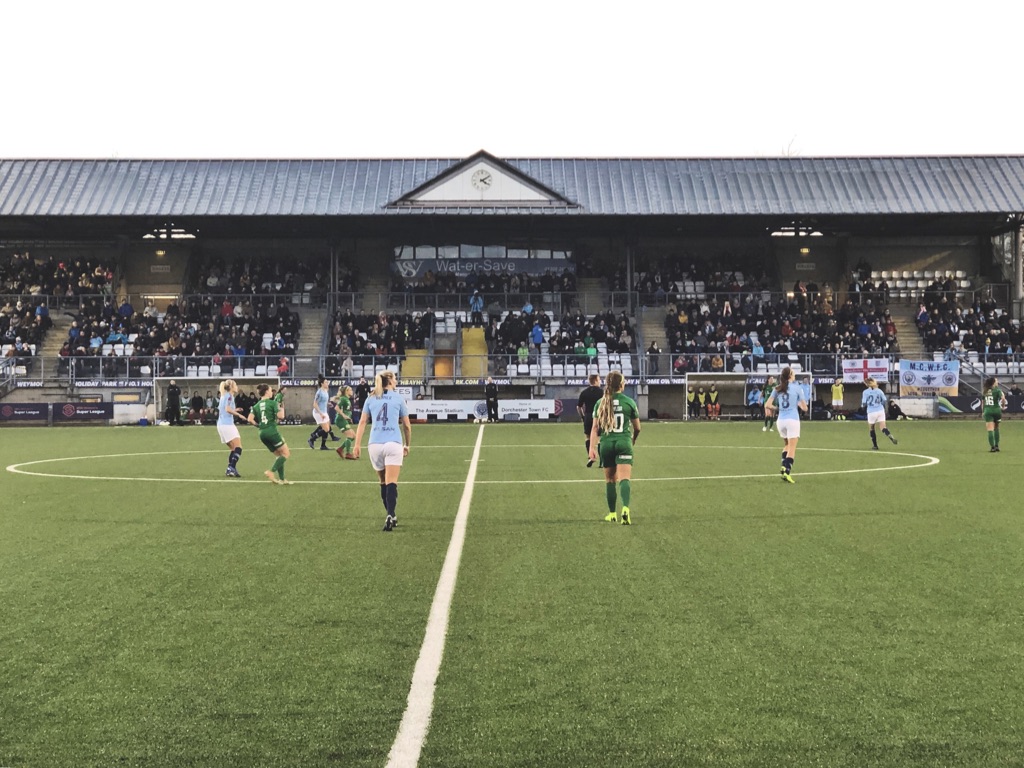On Friday afternoon, two days before the Lionesses compete for a World Cup Final, the Daily Telegraph, for reasons known only to themselves, decided to publish an article by Ross Clark which was a putrid example of all the worst types of tropes whenever a certain type of journalist discusses women’s football, spectacularly badly-timed, proudly ignorant and a badly-disguised misogynistic rant.
The pull quote doesn’t start well with “Much as many people would like to big up the Women’s World Cup to the level of the men’s, it clearly is not.” But in the spirit of debate and folk like this always yelling “read the article” we will, so many others don’t have to. So – hold your nose and let’s dive in.
“What a fantastic achievement for the Lionesses to have reached the final of the women’s football World Cup. I wish I could join in the celebratory atmosphere a little more, but to be honest I haven’t watched a single minute of the tournament. In fact I couldn’t even tell you how the England team reached the final, other than that they defeated Australia in the semi-finals. It is not that I have been trying to avoid women’s football, but I just haven’t managed to summon up the enthusiasm.”
Ah, now see…Ross Clark, your first mistake here, fella, is proudly telling everyone you’re going to write about a topic in a national newspaper you then say you haven’t watched a single minute of. You’re inspiring the same confidence in your reader that a surgeon that who admits that he left his glasses on the train.
It’s quite impressive to take a spectacular Godzilla-sized dump over your credibility in the second sentence of an article and expect people will take your opinion in any way as credible, mind you. Did they teach you that strategy at Cambridge?
“Partly, I suppose, it is down to the tournament being held in Australia, meaning that the matches have been on at times when I have been working. But more to the point, like many people, I have a limited appetite for watching sport on television, and this just doesn’t quite cut it as the kind of special occasion that does get me interested. Neither, it has to be said, do Premier League matches, although I do watch the men’s World Cup and the Euros.”
I know you probably had a word limit to live up to, but the “limited appetite for sport on telly” argument followed by “this World Cup doesn’t get me interested, though I do watch the men” is a lot of words to just say “I only think England football is worth watching when it’s MEN playing” which is what you want to say, right? It’s OK, fella. We’re all adults here.
“I would be quite bewildered, then, if we were suddenly given a bank holiday in the event of an England victory. I know that some people have been angling for such a holiday and the Government has been resisting, but from my point of view you might as well give us a day off to celebrate Grimsby Town’s two-nil victory over Salford City on Tuesday. Much as many people would like to big up the Women’s World Cup to the same level as the men’s, the latter – or simply the “World Cup” as almost all of us know it – has been an international occasion for many decades. It has history and folklore behind it.”
“Many of the fixtures rekindle long-established rivalries, as well as memories of incidents such as Maradona’s “Hand of God” and England’s failed penalty shootout against Germany in the semi-final of 1990. Maybe the Women’s World Cup will become part of our national culture in future, but it is foolish to pretend that it is anywhere close.”
Well done, first of all, for googling the football fixtures and picking a random League Two game from Tuesday. The lazy misogynistic journo would have picked a Premier League game but picking a League Two game adds that little nod and a wink to your target audience of fellow pub bores that you’re a man who KNOWS rubbish football. A man who can be trusted to write about the sport… though you’ve never written about the game in your life before in the Telegraph or anywhere else, you might have got away with it through the simple expedient of hinting you know where Blundell Park is.
You then ruin it, though, by trying to claim that the men’s World Cup has been going for decades and the women’s game doesn’t. First of all, the first Women’s World Cup was 1984, although it wasn’t called that. It probably would have been earlier but for the little issue of the women’s game mostly being banned nine years before the first men’s World Cup took place. That’s 40 years ago. Four decades, in case you’re counting.
Then you move on to try and claim the Women’s World Cup has no history, no iconic moments.
That is a spectacular display of your ignorance about the women’s game. A five minute Google would have brought up Brandi Chastain’s penalty, “Rapinoe to Wambach”, Laura Bassett’s own goal, Lucy Bronze v Norway, Japan’s surprise World Cup win in 2011, or the feats of Marta, Christine Sinclair, or the great names of women’s football history.
But that might have meant you’d have had to watch women’s football, so it’s a tough choice. Exposing yourself in a national newspaper column as spectacularly uninformed or five minutes of YouTube. Practically the same, really.
“Would it really be worth delivering another hit to the economy to celebrate victory in a minor, if growing, sporting event? We have already had one extra bank holiday this year – a “coronation” bank holiday which fell two days after the event itself. But that helped shrink the economy by 0.1 per cent in May, causing a blip in the otherwise surprisingly robust pattern of growth this year. It is not hard to see why.”
“There are typically between 20 and 23 working days in a month. Take away one of those and it is going to have a serious impact. Retail and hospitality might be able to make up for lost business by attracting more customers on days either side of the bank holiday, but it is more serious in those sectors in which it is not easy to make up for lost time.”
Here’s the thing, Ross. That Coronation bank holiday? A lot of people weren’t sure about that, but it was justified as celebrating a once-in-a-generation national event, even if that event did boil down to a Prince getting a promotion by someone putting a different crown on his head. That was the first coronation for 70 years. That’s literally the first one in a lifetime for the vast majority of the English population.
You know what else is a once-in-a-generation event? Winning a World Cup. There have been 22 men’s World Cups. That’s 22 chances for England men to win one. They have only made the final once in 22 tries (and don’t we know it). The women have tried nine times. They have made the semis regularly – but this is only the fourth major senior competition final an England team has EVER been in in the history of football, and only their second World Cup final in 31 combined competitions. It is, as they say, an event of national importance.
As for calling a WORLD CUP “minor”…you’re back to the “sports events are only important if MEN are playing them”.
This “minor event” has been watched live in the stadiums by over two million people and had ten million people tune in on a Wednesday lunchtime to watch England play – nearly a fifth of the English public. At 11am on a school and work-day. It holds the record for the biggest televised sports match in Australian history – beating events you’d probably consider “major” like the Ashes, the Rugby World Cup Final, the Australian Grand Prix and…yes, the actual Olympics. If you’re setting that bar as “minor” Ross, you’re only doing it for one reason.
“I wish the Lionesses good luck on Sunday. I hope those who watch it have a good time, and a great afternoon celebrating if the England team win. But no thanks, I don’t want a day off on Monday. Workshy Britain has had rather too much time off in recent years. It is about time we paid attention to lousy productivity and stopped looking for even more excuses to stay away from the office.”
Leaving aside the standard dog-whistling to pub bores of “workshy Britain” and the patronising tone of the finishing paragraph – you’re basically saying that in a country beaten down by the cost of living crisis, by division sown in the press and by the government, and everything else, you don’t think a country should be given a day to mark reaching the pinnacle of the sporting world and commemorate one of the greatest sporting achievements this country will ever see? That’s fair enough – that’s your opinion.
But the bigger problem here is that as a whole, this article absolutely drips with condescension, coded sexism, and perhaps most importantly of all, absolute disdain for the achievements of women. You may use a few longer words and try and express your views in “reasonable terms” but behind this article is the very simple message that women’s footballers don’t deserve to be celebrated for their sporting achievements at anywhere near the same level as men – that the pinnacle of their sport is not the pinnacle of men’s sport, just a “minor sporting event” equivalent to a League Two game in August.
This article, written two days before the greatest game of the Lionesses’ lives and one of the most important games in English football history, is a nasty, low, mean attempt to cut off the cheering before it starts. It’s a symptom of the sneering bile that comes in every “no one cares about women’s football” Twitter post. It appears in a paper claiming to have a strong commitment to women’s sport and betrays the work of journalists like Molly McElwee and Tom Garry to try and give the women’s game the coverage it deserves.
But most of all, it makes the writer (that’s you, Ross) look like an insecure, small-minded bore who can’t even be bothered to check the facts on the topic he’s writing about. And also one who thinks that the only women worth celebrating for should be when they bring his Sunday roast out of the kitchen.
And that view is dying a death with every ball the Lionesses kick. Your social media mentions probably tell you that. So do the article comments.
But at least it got the ad revenue in. So that makes it worth your while, right?









